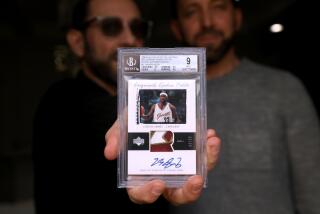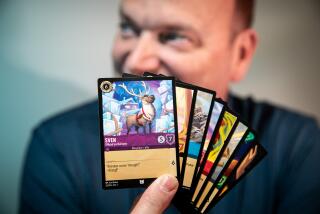Wait--Who Is Catching Whom?
Lines snake around the mall as if every retail corridor leads to a once-in-a-lifetime thrill ride. Hundreds of school-age believers stand in these queues, waiting for their chance to go to battle in the heart of Burbank’s Media City Center. They clutch one of two weapons: notebooks so overstuffed that they would put to shame the wedding albums of the parents who carted them here, or slim, brightly colored hand-held video games.
Some of the early birds are already engaged in tournament play at long, banquet-style tables where 22 kids duel at once. A peppy leader at one of the stations reels off the rules and reminds the players, “Nobody has cooties.” Only four competitors are girls, a ratio that will repeat itself throughout the day. The rest of what she says is nearly unintelligible to the uninitiated. Something about “freezing” characters, making them “sleep” or “faint,” outlawing “Mews.”
Not only do you “gotta catch ‘em all”--the ever-present Pokemon slogan that refers to the point of the game, to catch the 150 pocket monsters--you gotta speak the language to understand what is going on at this Nintendo-sponsored tournament on a Saturday morning in September. Those who aren’t in line are slouched or lazing on the mall floor, practicing Pokemon moves on their Game Boys or trading the Pokemon cards that spill from so many binders. The kids here not only speak the language, they live it.
“When I first played the video game, I played 24 hours straight with no breaks, except for food and to go to the bathroom,” says Kris Pukdam, 16, of Burbank.
Even at 16, Pukdam admits to watching the animated “Pokemon” TV show, which mirrors the magical quest of the video game. “It’s more dramatic and more moral than the video game. I like the battle scenes, but then you have to hear, ‘Ash [the main character] makes a new friend.’ Older kids already get this message,” he says, rolling his eyes.
“It’s you and me--I know it’s my destiny.”
--From the “Pokemon” theme song
If you can get beyond the manipulative lyrics pushing Pokemon, the words might strike an unintended chord. Every generation has its collectible toys and games. Boomers had marbles and baseball cards, their children have had Beanie Babies and now Pokemon. “But it’s different from baseball cards because they got more popular as the players got better,” says Michael Beck, who started a Pokemon card-playing league in Atlanta that often has 150 participants.
“With Pokemon, what matters is how hard the card is to get, the artwork. If someone gets the Charizard [a highly prized character], that’s the equivalent of the Babe Ruth rookie.”
A bit of sibling revelry led the 21-year-old Beck, now an information technology coordinator, to discover Pokemon. When his 12-year-old brother disappeared into his room with his Game Boy, “no one in the family could figure it out,” he says. Beck was sent to solve the mystery and became hooked himself.
The game’s appeal comes from being “in a whole separate world,” Beck says. “It’s a butterfly collection, if you will. Grass, rocks, the ocean . . . and you collect all of these species. . . . The collection part got me.”
“I’m not addicted to it or anything, but some kids are so psycho about it.”
--Anton Malsheve, 14
When a middle-school kid breaks down crying in the hallway, you know he’s got it bad. “This kid was the living, breathing Pokemon who fell down the stairs, and everyone was stealing his cards,” says Robert R. Butterworth, a child psychologist in Los Angeles who comes by his Poke-knowledge from his son, Anton Malsheve.
Interest in Pokemon is extremely keen in middle school, Butterworth says, because young teens have practically invented the concept of keeping up with the Joneses and certainly have perfected ostracism. “Peer pressure has a lot to do with it,” he says. “How that snowball rolls down the hill, I’m not sure. But in the end, the problem is, if you don’t have it, you’re not cool.”
Anton first heard about Pokemon from his friends and learned even more about the popularity of the game when his Pokemon cartridge was stolen. He says he’s over it now, because he’s beaten the game. “Once you beat it, what’s the point?” he asks.
Now he traffics in the Pokemon cards for their resale value. Says Anton: “Card shops are postal about this card thing.”
“They aren’t the same old thing.”
--Emily Rose Watson, 10, via e-mail
from Orlando, Fla.
That’s the most succinct reason one child gave for the allure of Pokemon. It’s new, and it’s different. “The cards have all kinds of different characters. . . . And they evolve, like we do, in stages,” Emily wrote.
At the Game Keeper in Westminster, which sponsors the league, the staff was almost clueless as to why the kids like the game. “To be honest, we don’t know. The kids want ‘em ‘cause it’s more of a social thing. Timmy has some, Johnny has some. I want some too,” says store manager Jeremy Graham, 22. (The Game Keeper has a vested interest; it is owned by Wizards of the Coast, which manufactures the cards.)
Adrienne Gaddis, 19, the “Pokemon Princess” who runs the weekly tournaments at the Zany Brainy store in Westlake Village, has her own idea about why kids have embraced the cards. “It’s not so much for the game, it’s for the trading. They like it for the characters, they are their superheroes. It’s like Garbage Pail Kids were for my age.”
Daniel O. Jaimes, 10, of La Mirada is sitting cross-legged near the merry-go-round at the Burbank mall playing a serious Pokemon card game with his friend Seth Morales.
“My boys created their own version of Pokemon, so four could play the card game at once,” says their father, Noel A. Jaimes.
Daniel says he likes the card game because “it’s like chess. You have to think what will outdo another one.”
“A real fad is something they talk about even when they’re not around it.”
--Chris Martin, father of two
Pokemon players in Chicago
Pokemon has been a positive in the Martin house. It allows the 7- and 8-year-old brothers to share a passion and take long car trips without getting into a fight. They aren’t playing Pokemon, though; they are talking about the video game, the cards, the TV show.
“I don’t see the cards as much different than me collecting baseball cards when I was 8 or 9,” Martin says. “They learn to collect things. They are placing value on things at a very early age. That’s kind of the way life is, too, and this helps them learn that.”
At age 5, Kalen Reddy of Plantation, Fla., has no qualms about showing the world where his interests lie. “He wants to be called Ash and introduces his new friends to me as Pokemon trainers,” says his mother, Susan Reddy. (Pokemon trainers are integral to the games and TV show.)
He rises by 7 a.m. to watch the TV show every day and constantly talks about the cards. He sports the de rigueur accessories for his age group--Pokemon sneakers, key chains and pencils. Because of the cards, he just started kindergarten at an advantage. He knows how to add, subtract and multiply three-digit numbers to figure out the “hit points,” or value, of each card.
Kalen isn’t into the video game yet. For that he’ll need a skill not yet taught on the playground. He needs to learn to read.
More to Read
The biggest entertainment stories
Get our big stories about Hollywood, film, television, music, arts, culture and more right in your inbox as soon as they publish.
You may occasionally receive promotional content from the Los Angeles Times.











